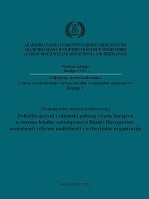REFORME ORGANIZACIJE I PODELE NADLEŽNOSTI GRADA BEOGRADA (2000-2022)
REFORMS OF THE ORGANIZATION AND DIVISION OF COMPETENCES OF THE CITY OF BELGRADE (2000-2022)
Author(s): Snežana S. Đorđević
Subject(s): Politics, Governance, Political history, Transformation Period (1990 - 2010), Present Times (2010 - today)
Published by: Akademija Nauka i Umjetnosti Bosne i Hercegovine
Keywords: division of competences of the city of Belgrade; decentralization; democracy; subsidiarity; participatory decision-making;
Summary/Abstract: The subject of this article is a description of the reforms of the organization and functioning of the city of Belgrade after the year 2000, with an emphasis on the current situation. The most important part of this analysis is the way of division of responsibilities between the state, city and city municipalities as well as local communities as a sub-municipal level of local government. The work follows the structure of the essential aspects of the local government system: status, elections, organization of government, jurisdiction, financing, to a lesser extent services, service provision, but most of these topics are integrated into the text. Emphasis is placed on the division of responsibilities and to some extent on financial regulation. The aim of the work is to analyze the instruments of democratization (the possibility of citizens’ involvement in decision-making) and the development of entrepreneurial capacities of the city of Belgrade, because it has greater potential than other local self-government units in Serbia to provide a greater scope and better quality of services due to economies of scale. Research question: Is the model of Belgrade’s organization democratic enough, to what extent is it decentralized (especially with regard to the division of responsibilities between the city and city municipalities as well as the form of direct involvement of citizens in decisionmaking processes) and does it in principle correspond to the needs of citizens and the community (tailored services according to the needs of citizens)? Methods: The paper will use the analysis of the content of documents (legal regulations and the legal model of city planning) as well as studies in this area, then comparative experiences of the planning of Belgrade from various stages of development and synthesis (deduction) of all experiences into some more general knowledge that can be used in improving the organization of Belgrade and other cities. This article is done as a case study of Belgrade. In her work, the author used her decades of experience in the reforms of Belgrade’s organization (decentralization, democratization, modernization of management). For this text, numerous public debates and conversations with officials of city municipalities and the city from all stages of reforms, as well as at the present time, are of great importance. They give this study a stronger connection to real life and practical problems, challenges and solutions made. Expected results: This analysis is a good basis for learning from other cities’ experience - good and bad practices of the functioning of Belgrade.
- Page Range: 130-150
- Page Count: 21
- Publication Year: 2022
- Language: Serbian
- Content File-PDF

